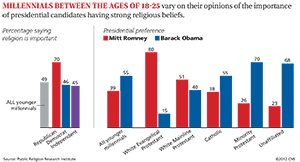WASHINGTON –– The youth vote –– which was big in 2008 when more than 22 million young adults in the U.S. under the age of 30 went to the polls –– looks elusive this year.
New surveys, including one from the Pew Research Center, show that young voters are more disengaged this election year. Forty-eight percent of this group is giving the election “a lot of thought” this year compared to 65 percent in 2008. Similarly, only 63 percent definitely plan on voting, compared to 72 percent four years ago.
 Click on graphic above for enlarged graph showing how millennials between the ages of 18-25 vary on their opinions of the importance of presidential candidates having strong religious beliefs. (CNS graphic/Emily Lockley)Another study, conducted by the Public Religion Research Institute and Georgetown University’s Berkley Center for Religion, Peace & World Affairs, finds that nearly two-thirds or 66 percent of younger millennials (age 18-25) are currently registered to vote and 50 percent said they are certain to vote in the November election.
Click on graphic above for enlarged graph showing how millennials between the ages of 18-25 vary on their opinions of the importance of presidential candidates having strong religious beliefs. (CNS graphic/Emily Lockley)Another study, conducted by the Public Religion Research Institute and Georgetown University’s Berkley Center for Religion, Peace & World Affairs, finds that nearly two-thirds or 66 percent of younger millennials (age 18-25) are currently registered to vote and 50 percent said they are certain to vote in the November election.
The study: “Diverse, Disillusioned and Divided: Millennial Values and Voter Engagement in the 2012 Election” was released Oct. 4. Daniel Cox, director of research and co-founder of Public Religion Research Institute, who presented the survey results at Georgetown University, said the reasons given in the survey for voter apathy included: disinterest, bored by politics, too busy to vote, not convinced votes count and not liking the election choices.
More white younger millennials (71 percent) reported being registered to vote than blacks (60 percent) or Hispanics (53 percent) in their age group.
Overall, the respondents gave Democratic President Barack Obama a 16-point advantage. When the group was broken down into various faith practices, 55 percent of Catholic younger millennials favored Obama while 38 percent favored Mitt Romney, his Republican opponent.
Eighty percent of white evangelical Protestants in the survey group support Romney, while 15 percent support Obama. A slim majority (51 percent) of white mainline Protestants younger millennial voters also prefer Romney.
The young voters also have very diverse opinions about religion and politics.
Nearly half (49 percent) of younger millennials said it is somewhat or very important for a candidate to have strong religious beliefs, while 48 percent said it is not too important or not at all important.
Cox said he assumed there would be more of a consensus in the group because of its religious, ethnic and racial diversity and was surprised at the wide range of viewpoints.
Even on the issue of affirmative action programs, respondents lacked agreement. Overall, 47 percent of younger millennials opposed these programs while 38 percent favored them. When broken down by race, 75 percent of blacks and 63 percent of Hispanics favored affirmative action, and 66 percent of whites opposed it.
“Millennials have a reputation for being the ‘wired’ generation, but when it comes to government, they’re unplugged,” said Cox.
“Across a range of measures, younger millennials indicate that they are disillusioned with the government’s ability to respond to their needs.”
Overall, the group displayed a high degree of pessimism about the democratic process and government. Sixty-three percent said “people like me don’t have any say about what the government does,” and 82 percent said business corporations have too much influence on the political process.
Survey interviews were conducted online from Aug. 28 to Sept. 10. The margin of error was plus or minus 4.3 percentage points.
At a news conference announcing the survey’s results, Hira Baig, a sophomore at Rice University in Houston said the survey results gave her mixed feelings. She was disappointed with the millennial voters disinterest in politics, but she also took to heart the number of young people who have registered to vote and who discuss these issues on campus.
That alone, she said, “gives me a little bit of hope.”
